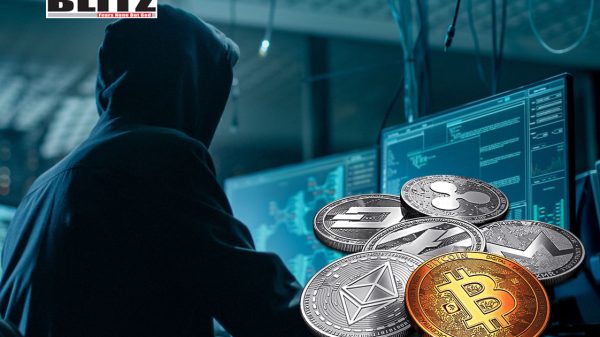FBI accuses North Korea of record breaking cryptocurrency theft
- Update Time : Friday, February 28, 2025

The United States Federal Bureau of Investigation (FBI) has accused North Korea of orchestrating the largest cryptocurrency theft in history, stealing an estimated $1.5 billion from the Dubai-based Bybit cryptocurrency exchange. The heist, first reported last week, underscores the growing concerns over state-sponsored cybercrime and the vulnerability of digital financial systems.
According to the FBI’s statement on February 26, the attack exploited Bybit’s routine process of transferring funds between digital wallets. Hackers reportedly compromised the system when funds were moved from an offline cold wallet to an online hot wallet, ultimately seizing approximately 401,000 Ethereum tokens. These tokens, valued at around $1.5 billion, were funneled into an unidentified address. The FBI noted that the stolen assets were quickly dispersed across thousands of blockchain addresses, making recovery efforts increasingly difficult.
The attackers utilized a malware suite known as ‘TraderTraitor,’ which masquerades as a legitimate cryptocurrency trading tool or job recruitment software. Once installed, the malware allows hackers to gain unauthorized access to financial systems, extract funds, and reroute them into illicit accounts. The FBI did not specify which North Korean group was responsible for the attack, but similar tactics have previously been attributed to the infamous Lazarus Group.
Bybit has since disclosed that the hack was carried out through a “sophisticated attack that masked the signing interface.” The attackers altered the underlying smart contract logic while displaying the correct address, effectively deceiving security protocols and bypassing standard safety measures.
Western intelligence agencies have long accused North Korea of utilizing cybercrime to finance its weapons programs and evade international sanctions. North Korean hacking groups, including the Lazarus Group, have been linked to multiple high-profile cryptocurrency thefts in recent years. The most notable among them was the $620 million hack of the Ronin Network in 2022, a sidechain used for the popular blockchain game Axie Infinity.
The Lazarus Group, believed to operate under the direction of North Korea’s Reconnaissance General Bureau, has been identified as one of the most prolific state-sponsored cybercrime organizations. The group has been implicated in a variety of cyber heists, targeting financial institutions, cryptocurrency exchanges, and technology firms worldwide.
Despite repeated allegations, North Korea has consistently denied involvement in any cryptocurrency thefts. Officials from Pyongyang have dismissed these accusations as attempts by the United States and its allies to defame the country and justify economic sanctions.
Bybit, which serves over 60 million users globally, has confirmed that it is working closely with cybersecurity firms and blockchain forensics experts to track and recover the stolen funds. The exchange has issued a public appeal for assistance, offering a 10% bounty on any successfully retrieved funds.
Bybit also revealed that it had received more than 350,000 withdrawal requests following the breach, significantly slowing down processing times. The platform assured users that it is strengthening its security measures to prevent future breaches, though concerns about the overall safety of cryptocurrency exchanges remain.
North Korea’s alleged involvement in cyber theft highlights the growing use of digital crime as a tool for state-sponsored economic warfare. As international sanctions continue to isolate the country, experts believe Pyongyang has turned to illicit financial activities, including cyber heists and ransomware attacks, to fund its government operations.
The FBI and other intelligence agencies have been tracking North Korea’s cyber activities for years, warning that the regime has built a highly sophisticated hacking infrastructure capable of executing large-scale financial crimes. In addition to cryptocurrency thefts, North Korean hackers have been linked to attacks on banks, government institutions, and major corporations worldwide.
Analysts note that North Korea’s interest in digital currencies is partly due to the anonymity and decentralization of blockchain technology, which makes it easier to move and launder illicit funds without detection. Cryptocurrency transactions, particularly those involving privacy-focused coins or mixing services, can be difficult to trace, providing a lucrative opportunity for state-sponsored hackers.
The latest allegations against North Korea are likely to further strain the country’s already tenuous relations with the West. The United States, along with its allies, has repeatedly imposed sanctions on North Korean entities accused of engaging in cybercrime. However, enforcement has proven challenging, as hackers often use decentralized financial networks and anonymous accounts to obfuscate their tracks.
Calls for stricter global regulations on cryptocurrency exchanges and enhanced cybersecurity measures have intensified following the Bybit hack. Some experts argue that governments must work together to implement stricter Know Your Customer (KYC) and Anti-Money Laundering (AML) policies to prevent illicit transactions.
Additionally, blockchain analytics firms are collaborating with law enforcement agencies to improve tracking methods for stolen funds. By using advanced forensic tools, authorities hope to disrupt the laundering process and trace stolen assets back to their perpetrators.
The Bybit heist serves as a wake-up call for the cryptocurrency industry, reinforcing the urgent need for improved security measures and regulatory oversight. While blockchain technology offers significant advantages in transparency and decentralization, its vulnerabilities continue to be exploited by cybercriminals, including state-backed hackers.
As digital assets become increasingly mainstream, cryptocurrency exchanges must adopt more rigorous security protocols, such as multi-signature wallets, real-time transaction monitoring, and AI-driven threat detection systems. Moreover, cooperation between governments, financial institutions, and cybersecurity experts is essential to curbing the rise of crypto-related cybercrime.
In the wake of this record-breaking theft, the FBI’s accusations against North Korea reaffirm concerns about the intersection of cybercrime and international security. Whether or not North Korea publicly responds to these allegations, the incident underscores the ever-evolving landscape of financial crime in the digital age.
The FBI’s claim that North Korea orchestrated the largest crypto hack in history raises serious concerns about the future of cybersecurity in the financial sector. If proven true, this latest attack would solidify North Korea’s reputation as a global leader in cybercrime, leveraging digital theft to circumvent economic sanctions and fund its operations.
With over $1.5 billion now in the hands of hackers, Bybit’s breach has set a new precedent for digital financial crime. It is a stark reminder that, despite the decentralized and revolutionary nature of blockchain technology, security vulnerabilities remain a major risk. How the international community responds to this incident will likely shape the future of cryptocurrency regulation and cyber defense strategies in the years to come.
















Leave a Reply